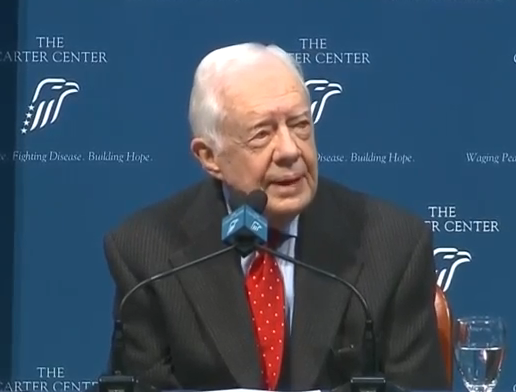During the press conference this morning on the condition and future of former US President Jimmy Carter, Mr Carter explained his situation with his cancer and it’s spread to his brain.
The 90-year-old Carter, who appeared in exceptional spirits, as part of the press conference Q & A, discussed his work with the Carter Center, one of the premier institutions in the battle with infectious diseases.

An Atlanta-area reporter asked the former President: “You have had such a scope of work in your life. In the time that you have left, what would give you the most satisfaction to see something happen? Peace in the Middle East or eradication of polio or — what — what are those things that you hold onto the most that would give you the greatest satisfaction for the world and if you can look at the state of the world and how you’ve been working in efforts to try and…
Carter, a major figure in battling infectious diseases since the mid-80s responded: “As far as the Carter Center’s concerned, I would like to see guinea worm completely eradicated before — before I die. I’d like for the last guinea worm to die before I do.
“I think right now, we have 11 cases. We started out with 3.6 million cases. And I think we have two cases in South Sudan and one case in Ethiopia and one case in Mali and seven cases in Chad. That’s all the guinea worms in the world, and we know where all of them are. So obviously, that would be my top priority.”
Guinea worm disease, a parasitic infection caused by roundworm, Dracunculus medinensis, may be the next human infectious disease to be eradicated and the first without the use of vaccines.
To put in perspective, when the first international campaign to eradicate the parasitic disease in 1986 commenced, there were an estimated 3.5 million Guinea worm cases occurring annually in Africa and Asia.
Considered a neglected tropical disease, Guinea worm disease is contracted when people consume water contaminated with Guinea worm larvae. After a year, a meter-long worm slowly emerges from the body through a painful blister in the skin.
In the absence of a vaccine or medical treatment, the ancient disease is being wiped out mainly through community-based interventions to educate and change behavior, such as teaching people to filter all drinking water and preventing contamination by keeping anyone with an emerging worm from entering water sources.
God Bless you Mr President.
Robert Herriman is a microbiologist and the Editor-in-Chief of Outbreak News Today
Follow @bactiman63
Video/C-Span
Related news:
Ghana certified Guinea worm free by WHO
Outbreak News Radio: River blindness, Lyme disease
Hôpital Albert Schweitzer Haiti receives grant to battle HIV


So saddened to hear about the terminal cancer… President Carter is one of those people who have made a difference in this world which has touched the lives of many for the goodness of the people. God Bless…